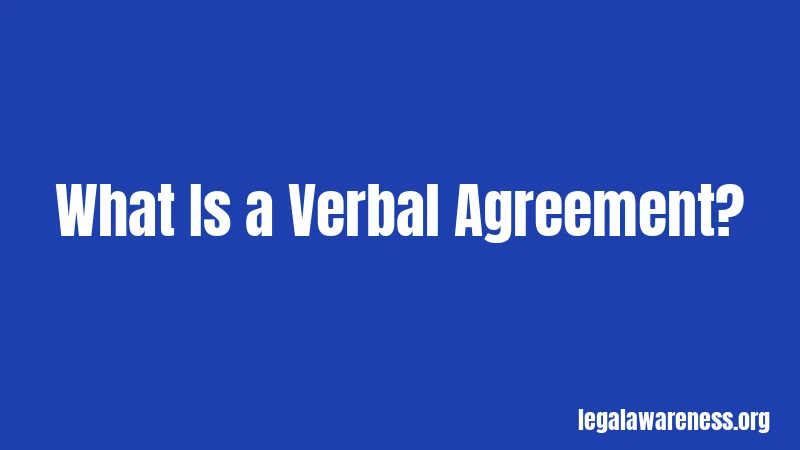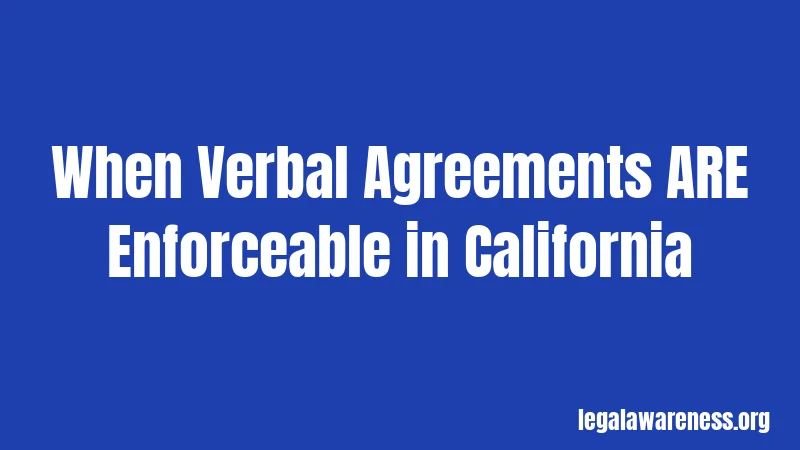Verbal Agreement Laws in California (2026): What’s Actually Binding
Most people don’t realize how tricky verbal agreements can be in California. You might think a handshake deal or a phone conversation is binding. Spoiler alert: sometimes it is, sometimes it absolutely isn’t. The rules are super specific. Let’s break down exactly what you need to know so you don’t get caught off guard.
California has strict rules about which verbal agreements are actually enforceable. This matters whether you’re running a business, making a deal with a friend, or negotiating something important. Get it wrong, and you might lose money or have no legal leg to stand on. Let’s dig into the details.
What Is a Verbal Agreement?

A verbal agreement is basically a contract made by talking. No paperwork. No signatures. Just words between two people (or more). The big question is: does California recognize it as a real, legally binding deal?
Here’s the thing: California does enforce some verbal agreements. But not all of them. That’s where it gets tricky. The state has specific rules about which ones count and which ones don’t. Most people get this wrong, honestly.
The Main Rule: California’s Statute of Frauds
Ready for the most important part? Hold on. This is key.
California has something called the Statute of Frauds. It’s a law that says certain contracts must be in writing to be enforceable. If a contract falls under the Statute of Frauds, and you only have a verbal agreement, a court won’t enforce it. You’re out of luck.
So what contracts need to be in writing? Okay, pause. Read this carefully.
The Statute of Frauds requires written contracts for these situations:
Real estate sales and long-term leases are big ones. If you’re selling land or renting something for more than one year, you need it in writing. Think of it like property transactions require extra proof.
Contracts that can’t be completed within one year need to be written down. If the deal is supposed to take longer than 12 months, it falls under the Statute of Frauds. Let me give you an example. Say you agree to work for someone for two years. That needs to be in writing to be enforceable.
Marriage agreements have to be in writing. This one’s pretty straightforward. You can’t enforce a promise to marry through a verbal agreement.
Guaranteeing someone else’s debt requires a written contract. If you promise to pay someone’s bills if they don’t, that promise needs to be in writing.
Executor promises about estate debts need to be written. When someone handles a dead person’s estate, their promises about debts must be documented.
When Verbal Agreements ARE Enforceable in California

So here’s the good news: not all verbal agreements are worthless. Some of them totally count.
If a contract doesn’t fall under the Statute of Frauds, a verbal agreement can be enforceable. This is important stuff. Let me break down the ones that usually work.
Simple business deals and services are often enforceable verbally. Need a plumber to fix your sink? A verbal agreement works. Want to hire someone to mow your lawn? That’s fine too. These kinds of short-term service contracts don’t require writing.
Sales of goods (not real estate) under the California Uniform Commercial Code can sometimes be enforced verbally. But here’s the twist: California usually still requires writing for anything over $500. So technically, you could enforce a verbal agreement for a sale of goods worth less than $500. But honestly, I’d recommend getting it in writing anyway.
Payments for professional services often work verbally. Doctors, lawyers, and other professionals can sometimes enforce verbal agreements for their fees. This depends on the situation though.
Employment contracts can be verbal in many cases. If someone hires you for a job, and there’s no specific term or it’s just standard employment, a verbal agreement might work. But the second you get into details about a specific time period, that might flip to needing writing.
The Partial Performance Exception
Here’s where things get interesting. There’s something called “partial performance” that can sometimes save a verbal agreement.
If you’ve already partially performed a verbal real estate contract, a court might enforce it anyway. You literally performed your part of the deal. You can’t undo it. So the court says, okay, we’ll enforce this even though it’s verbal.
Example time. You agreed verbally to buy someone’s house. You paid the down payment and moved in. Now the seller wants to back out. In California, partial performance might let you enforce that verbal agreement even without writing.
But wait. Partial performance only applies to real estate deals. You can’t use it for other types of contracts that fall under the Statute of Frauds.
Key Signs Your Verbal Agreement Might Not Be Enforceable

Wondering if your agreement is actually binding? Here’s what to watch for.
If the deal involves real estate and you haven’t put anything in writing, you’re in the danger zone. Same goes for anything that won’t be completed within one year. Long-term promises without documentation are risky.
Not sure what counts as a violation? Let me break it down. If someone promised you something that’s supposed to happen more than a year from now, and nothing is written down, you probably can’t enforce it.
Confused about the difference? It comes down to what type of deal you made. Statute of Frauds contracts absolutely need writing. Everything else? Well, it depends.
What Happens If You Have a Verbal Agreement But No Writing?
So you made a verbal agreement. Now what happens if the other person doesn’t follow through?
A court probably won’t enforce it if it falls under the Statute of Frauds. That’s honestly the biggest consequence. You might have a valid agreement, but if nobody can prove it existed, you’re stuck.
This is why people end up in disputes. One person says they made a deal. The other person says they didn’t. With no written proof, a judge has to decide who’s telling the truth. Guess what? That’s really hard. You might lose even if you’re right.
The other issue is evidence. How do you prove what was said on a phone call six months ago? Text messages help. Emails help. Witnesses help. But a casual conversation with no documentation? That’s tough to prove.
How to Protect Yourself: Getting a Verbal Agreement in Writing
Here’s the practical stuff. What should you actually do?
Always get important agreements in writing. Seriously. This is the easiest way to protect yourself. A simple written agreement doesn’t need to be fancy. It just needs to cover the key points.
Write down who’s involved. State what each person is supposed to do. Put in the timeline. Include the date. Have both people sign it. Done.
You don’t need a lawyer to draft something basic. For simple agreements, you can write it yourself. Just make sure it’s clear and both people understand it.
If the agreement is complex or involves a lot of money, get a lawyer involved. They can make sure you’re protected. Yes, it costs money. But it’s way cheaper than going to court later.
Email confirmation works too. If you agree to something verbally, follow up with an email summarizing the agreement. Have the other person reply agreeing. Boom. Now you have documentation.
Text messages and written messages count as evidence. If you talk to someone verbally and then follow up with a text saying “Just to confirm, we agreed to…” and they reply “Yes, that’s right,” you’ve created a written record.
Recent Changes to California Contract Law
California laws on verbal agreements haven’t dramatically changed recently, but there have been some clarifications. The state continues to enforce the Statute of Frauds pretty strictly.
One thing that’s evolved is how courts view electronic communications. Emails and text messages are now clearly recognized as “writing” for purposes of the Statute of Frauds. This is great news for people dealing with modern agreements. You don’t need pen and paper anymore.
California courts have also gotten clearer about what counts as partial performance. The rules are specific, but they do recognize that sometimes partial performance can help enforce a verbal real estate agreement.
Frequently Asked Questions
Can I enforce a verbal business contract in California? It depends. Short-term service contracts usually work. Anything longer than one year or involving real estate needs to be in writing. When in doubt, get it in writing.
Are text messages considered writing for the Statute of Frauds? Yes. California courts recognize electronic messages as writing. Email and text count.
What if the other person lies about the verbal agreement? Your word against theirs. That’s why writing matters. Without proof, a judge decides based on witness credibility, which is risky.
Is a handshake deal binding in California? Technically, yes, if it doesn’t fall under the Statute of Frauds. But proving it exists is the problem. Get something in writing anyway.
Can I use a witness to prove a verbal agreement? A witness can help, but it’s not as good as writing. A credible witness’s testimony can be evidence, but it’s still just their word.
Final Thoughts
Here’s what you actually need to remember: not all verbal agreements are enforceable in California, especially anything involving real estate, long-term commitments, or marriage promises. Statute of Frauds contracts must be in writing. For everything else, you’re technically okay verbally, but practically speaking, you should get important agreements documented anyway.
The golden rule is simple: when in doubt, get it in writing. It takes five minutes, solves so many problems, and keeps everyone on the same page. Don’t risk money or important agreements on a handshake. Write it down, have both people sign or confirm it, and keep a copy. You’ll be glad you did.
Now you know the basics. Stay informed, stay protected, and when in doubt, look it up or ask a lawyer.
References
California Statute of Frauds – California Civil Code Section 1624
California Uniform Commercial Code – Sales of Goods
California Courts – Enforcing Contracts
